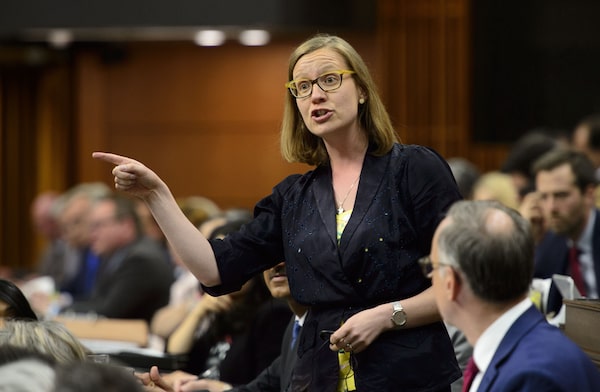
Speaking with The Globe and Mail, International Development Minister Karina Gould, seen here on June 10, 2019, said she is in the midst of talking to international agencies and non-governmental organizations about where the Canadian support is needed most.Sean Kilpatrick/The Canadian Press
The Canadian government will soon roll out millions in foreign aid spending to help combat the spread of COVID-19 abroad, particularly in refugee camps and developing countries, says International Development Minister Karina Gould.
Last week, the government announced plans to pledge $50-million to the World Health Organization and other bilateral aid as a part of a larger $1-billion coronavirus response package. Some of the foreign aid money, which comes from a special crisis fund, is expected to start flowing to organizations in the coming days.
Speaking with The Globe and Mail Thursday, Ms. Gould said she is in the midst of talking to international agencies and non-governmental organizations about where the Canadian support is needed most. She said she is concerned about the impact COVID-19 will have on the world’s most vulnerable, particularly people in refugee camps.
“They’re already in close quarters, their access to health care is limited. Their ability to get tested is limited. Their access to food and sanitation is limited. So one of the things we need to be doing is to ensure we are containing the spread within those very marginal and vulnerable populations,” Ms. Gould said in a phone interview.
The government will announce which groups will receive some of the aid money soon, she said, adding that Ottawa also wants to ensure it has the flexibility to respond to “emerging needs” as the virus spreads globally. While there does not appear to be a major outbreak in a refugee camp yet, she said “we’re always going to be five to 14 days behind the virus so just because there aren’t cases reported doesn’t mean that there aren’t cases there.”
The foreign aid spending will also support research to develop a COVID-19 vaccine, she continued, emphasizing the importance of Canadian international development aid spending, especially in the health sector, at this time.
“We can’t prioritize one population over another because it doesn’t matter who you are, where you live or what your socio-economic background is. The virus doesn’t care about those things.“
Coronavirus guide: What you need to know about COVID-19 and its toll around the world
The UN Refugee Agency (UNHCR) said 11 asylum seekers have contracted the virus in Germany, and a facility where one of the refugees was staying is now on lockdown.
“To effectively deal with the crisis, refugees and other displaced populations should be included in all national preparedness and response plans," said Rema Jamous Imseis, the UNHCR’S representative to Canada.
Brittany Lambert, a women’s rights and advocacy specialist with Oxfam Canada, said social distancing is “totally impossible” in overcrowded camps, where there is often not enough clean water for everyone to wash their hands.
About 20,000 people are crammed into the Moria refugee camp on the Greek island of Lesbos, which was originally built for about 3,000, she said. A case has been reported on the island, she added, and if the virus makes its way to any of the camps, “it would just be devastating.”
Ms. Lambert said Oxfam is ramping up its efforts in larger refugee camps in Myanmar and Jordan by helping people with hygienic needs, but also by providing information on sanitary practices and the virus itself through a text message campaign to help combat the spread of misinformation.
While Africa appears to be one of the least affected continents so far, she said, positive COVID-19 cases have emerged in a number of countries that have refugee camps such as Kenya, Sudan, Nigeria and the Democratic Republic of Congo.
“In a country like the Democratic Republic of Congo … there’s just so much ongoing conflict and displacement, people moving around, it becomes very hard to trace contact and to test people properly.”
Jessie Thomson, CARE Canada’s vice-president of international programs, said her organization is also concerned about large refugee camps such as Cox’s Bazar in Bangladesh.
“The most recent information I had from Bangladesh, for example, was that COVID testing was only available in Dhaka, so it’s not available in places like Cox’s Bazar. So the testing capabilities in these more rural areas and in refugee settings is a challenge and as a result we’re not having much information.”
Save the Children warned this week that the millions of vulnerable young people and families living in refugee camps “cannot be forgotten." Dr. Zaeem Haq, the organization’s medical director, raised the challenge a family of 10 would face trying to self isolate while living together in a tent and sharing a toilet with others. He would also like to see more support directed to health services in refugee camps.
The spread of the novel coronavirus that causes COVID-19 continues, with more cases diagnosed in Canada. The Globe offers the dos and don'ts to help slow or stop the spread of the virus in your community.
The Globe and Mail
Sign up for the Coronavirus Update newsletter to read the day’s essential coronavirus news, features and explainers written by Globe reporters.
 Janice Dickson
Janice Dickson